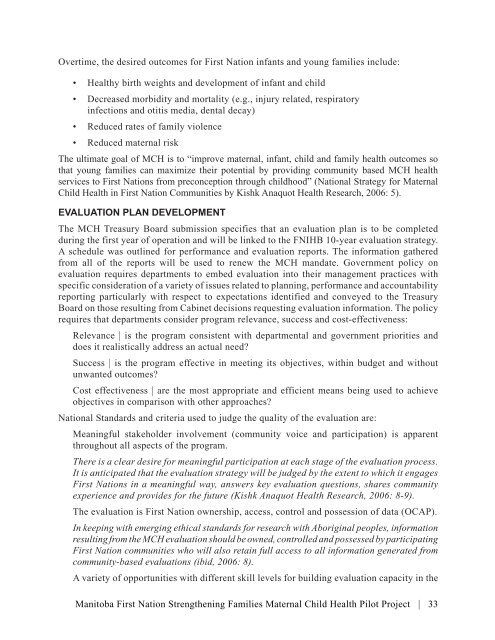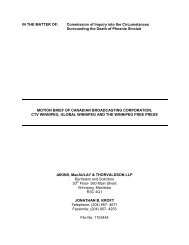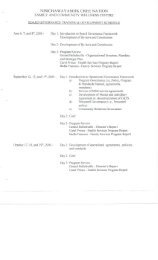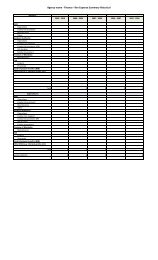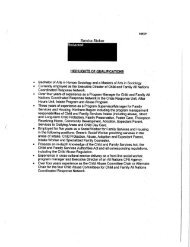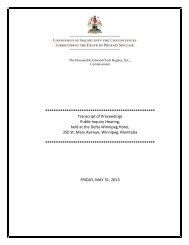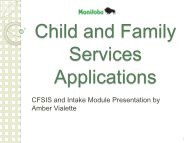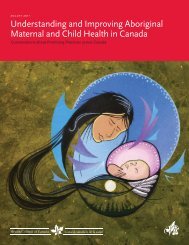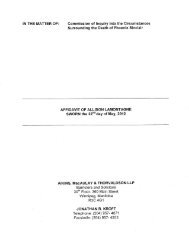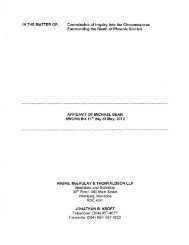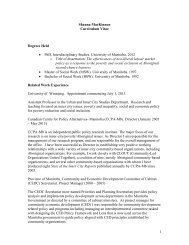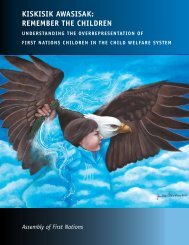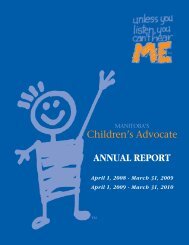Untitled - Phoenix Sinclair Inquiry
Untitled - Phoenix Sinclair Inquiry
Untitled - Phoenix Sinclair Inquiry
You also want an ePaper? Increase the reach of your titles
YUMPU automatically turns print PDFs into web optimized ePapers that Google loves.
Overtime, the desired outcomes for First Nation infants and young families include:<br />
• Healthy birth weights and development of infant and child<br />
• Decreased morbidity and mortality (e.g., injury related, respiratory<br />
infections and otitis media, dental decay)<br />
• Reduced rates of family violence<br />
• Reduced maternal risk<br />
The ultimate goal of MCH is to “improve maternal, infant, child and family health outcomes so<br />
that young families can maximize their potential by providing community based MCH health<br />
services to First Nations from preconception through childhood” (National Strategy for Maternal<br />
Child Health in First Nation Communities by Kishk Anaquot Health Research, 2006: 5).<br />
EVALUATION PLAN DEVELOPMENT<br />
The MCH Treasury Board submission specifies that an evaluation plan is to be completed<br />
during the first year of operation and will be linked to the FNIHB 10-year evaluation strategy.<br />
A schedule was outlined for performance and evaluation reports. The information gathered<br />
from all of the reports will be used to renew the MCH mandate. Government policy on<br />
evaluation requires departments to embed evaluation into their management practices with<br />
specific consideration of a variety of issues related to planning, performance and accountability<br />
reporting particularly with respect to expectations identified and conveyed to the Treasury<br />
Board on those resulting from Cabinet decisions requesting evaluation information. The policy<br />
requires that departments consider program relevance, success and cost-effectiveness:<br />
Relevance | is the program consistent with departmental and government priorities and<br />
does it realistically address an actual need?<br />
Success | is the program effective in meeting its objectives, within budget and without<br />
unwanted outcomes?<br />
Cost effectiveness | are the most appropriate and efficient means being used to achieve<br />
objectives in comparison with other approaches?<br />
National Standards and criteria used to judge the quality of the evaluation are:<br />
Meaningful stakeholder involvement (community voice and participation) is apparent<br />
throughout all aspects of the program.<br />
There is a clear desire for meaningful participation at each stage of the evaluation process.<br />
It is anticipated that the evaluation strategy will be judged by the extent to which it engages<br />
First Nations in a meaningful way, answers key evaluation questions, shares community<br />
experience and provides for the future (Kishk Anaquot Health Research, 2006: 8-9).<br />
The evaluation is First Nation ownership, access, control and possession of data (OCAP).<br />
In keeping with emerging ethical standards for research with Aboriginal peoples, information<br />
resulting from the MCH evaluation should be owned, controlled and possessed by participating<br />
First Nation communities who will also retain full access to all information generated from<br />
community-based evaluations (ibid, 2006: 8).<br />
A variety of opportunities with different skill levels for building evaluation capacity in the<br />
Manitoba First Nation Strengthening Families Maternal Child Health Pilot Project | 33


